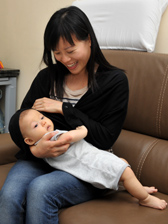
Loving bond:
Debby Lam says breastfeeding nourishes her baby physically and emotionally.
Loving bond:
Debby Lam says breastfeeding nourishes her baby physically and emotionally.
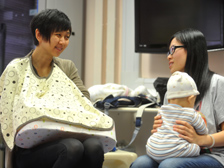
Experience shared:
Debby Lam (right) volunteers her time to share her breastfeeding experience with other women who have a child or are expecting one.
Experience shared:
Debby Lam (right) volunteers her time to share her breastfeeding experience with other women who have a child or are expecting one.
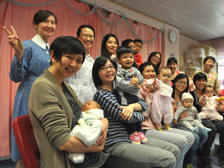
Happy mothers:
With peer support between mothers, their breastfeeding period will last longer.
Happy mothers:
With peer support between mothers, their breastfeeding period will last longer.
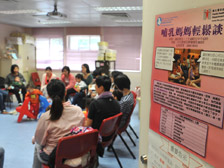
Support network:
Peer counsellors at Lek Yuen, Chai Wan, and Maurine Grantham Maternal & Child Health Centres advise breastfeeding mothers once a week.
Support network:
Peer counsellors at Lek Yuen, Chai Wan, and Maurine Grantham Maternal & Child Health Centres advise breastfeeding mothers once a week.
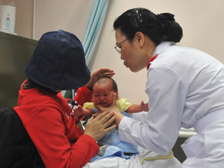
Personal service:
Mothers can bring their babies to Maternal & Child Health Centres for a professional consultation and follow-up assistance.
Personal service:
Mothers can bring their babies to Maternal & Child Health Centres for a professional consultation and follow-up assistance.
Love grows from breastfeeding
May 12, 2013
Mother of two Debby Lam breastfed her eldest son until he was one-year old, and she is breastfeeding her younger son as well.
"Breastfeeding is not just about health, it is convenient and saves money. More importantly, the baby can feel the warmth and security from me," Mrs Lam said.
"Breastfeeding nourishes my baby physically and emotionally, creating a loving bond between us.”
The World Health Organisation recommends that newborn babies are breastfed for six months, and should continue to have breast milk until two years of age or more. However, despite this advice, some people still have misconceptions or questions about breastfeeding.
Mrs Lam's younger son, Yat-hei, was born four weeks premature, weighing only 1.6kg at birth. She said many people have questioned her decision to breastfeed him, claiming breast milk cannot provide enough nutrients. However, she believes it is the best way to nourish her baby.
According to the Baby Friendly Hospital Initiative Hong Kong Association, an organisation established by UNICEF to support breastfeeding, the breast milk of mothers of preterm babies provides more immunity protection.
Newborn babies need to be fed frequently. Mrs Lam feeds Yat-hei on demand, and once fed him 21 times in one day.
Although it is a physical challenge, she believes breast milk gives her child natural antibodies to boost his immunity. With the encouragement of health professionals and with her husband's support, Mrs Lam has breastfed Yat-hei for nine months so far, and plans to wean him off breast milk naturally.
Peer support
With her experience, Mrs Lam has joined a training project co-organised by the Department of Health and the Baby Friendly Hospital Initiative Hong Kong Association, volunteering her time to share her breastfeeding experience with other women who have a child or are expecting one.
The project was set up in December 2011 to train mothers experienced in breastfeeding to be peer counsellors. They serve at Lek Yuen, Chai Wan, and at Maurine Grantham Maternal & Child Health Centres by giving out advice to breastfeeding mothers at gatherings once a week.
Questions like: 'how do I know my baby is getting enough milk?'; 'do I need to give my baby formula?'; and, 'how do I continue breastfeeding after returning to work?'; are often on the minds of new and expectant mothers. They are best answered by those who are experienced.
Mrs Lam is one of the peer counsellors in the second batch of graduates. She completed a 20-hour training course on breastfeeding counselling and is now doing her eight-hour practicum. She listens to the needs of the new mothers, and offers advice and support to encourage them to continue breastfeeding.
New mother Ivy Tsang brought her seven-week-old baby to the peer group.
"It was not easy in the beginning but I found companions in the group. I gained positive energy by hearing their experiences."
Leung Po-ling, Nurse Officer of the Lek Yuen Maternal & Child Health Centre said peer support is crucial.
“Breastfeeding mums need a lot of care, support and recognition."
Ms Leung, who has been counselling and helping mothers solve breastfeeding problems for more than 10 years, said they always encounter difficulties in the beginning which may make them give up on breastfeeding.
"Most breastfeeding mothers are exhausted, emotional and cry easily. They do not realise that it takes time for a baby to learn how to suckle, and so blame themselves.”
Ms Leung also found that family members are sometimes the source of pressure on mothers.
“They don’t understand the mothers. They think it is torture when babies need to be fed so frequently and the mothers cannot take a rest. This may cause them to prefer formula milk."
Ms Leung said that research shows that with peer support between mothers, their breastfeeding period will last longer, therefore the peer project helps invigorate them.
Professional help
The Government has all along endeavoured to promote and support breastfeeding. All 31 Maternal & Child Health Centres provide personal breastfeeding advice. Mothers can bring their babies to the centres for a professional consultation and follow-up assistance.
With this support, the percentage of newborn babies who had been 'ever-breastfed' rose from 50% in 1997 to 85% last year, according to the Department of Health. An ever-breastfed baby is one that has been fed breastmilk, even for just one time.
Addressing the new and expecting mothers, Mrs Lam said: "Nothing is better than breast milk. A mother is still a good mother even if she breastfeeds her baby only one day. Give it a try. Breastfeeding is the most natural thing every mother can do.”
Ms Leung said it takes time for women to get familiar with breastfeeding. The skills required develop over the first four to six weeks.
To ensure their baby's health, mothers encountering problems breastfeeding should seek help from health professionals, such as by calling the Family Health Service breastfeeding hotline 2961 8868.